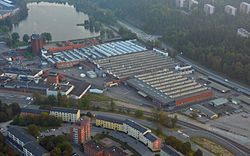
Back سكانيا (شركة) Arabic سكانيا ARY سكانيا ARZ Scania AST ایسکانیا AZB Scania Byelorussian Скания АБ Bulgarian Scania Czech Scania Danish Scania German
 Logo of Scania AB | |
 Scania's headquarters in Södertälje | |
| Formerly | AB Scania-Vabis |
|---|---|
| Company type | Subsidiary |
| Industry | Automotive |
| Predecessors | |
| Founded | 1911 |
| Headquarters | , Sweden |
Number of locations | 10 |
Area served | Worldwide |
Key people | |
| Products | |
| Services | Financing, leasing, insurance |
| Revenue | |
| Total assets | |
| Total equity | |
Number of employees | |
| Parent | Traton |
| Website | www |
Scania AB (/ˈskæniə/ SKAN-ee-ə, Swedish: [ˈskɑ̌ːnɪa]), stylised SCANIA in its products, is a major Swedish manufacturer headquartered in Södertälje, focusing on commercial vehicles—specifically heavy lorries, trucks and buses. It also manufactures diesel engines for heavy vehicles as well as marine and general industrial applications.
Scania was formed in 1911 through the merger of Södertälje-based Vabis and Malmö-based Maskinfabriks-aktiebolaget Scania. Since 1912, the company headquarters have been based in Södertälje after the merger. Today, Scania has production facilities in Sweden, France, the Netherlands, Thailand, China, India, Argentina, Brazil, Poland and Finland.[3] In addition, there are assembly plants in ten countries in Africa, Asia and Europe. Scania's sales and service organisation and finance companies are worldwide. In 2012, the company employed approximately 42,100 people around the world.[3]
Scania was listed on the NASDAQ OMX Stockholm stock exchange from 1996 to 2014.[4][5] The company is a subsidiary of Traton, part of the Volkswagen Group.
Scania's logo shows a griffin, from the coat of arms of the province of Scania (Swedish: Skåne).[6]
- ^ a b "Board of Directors". Scania AB. Retrieved 3 May 2021.
- ^ a b c d e f "2022 Annual and Sustainability Report" (PDF). Scania AB. pp. 4, 71–72. Retrieved 28 May 2023.
- ^ a b "Key figures Scania (2012)". Scania. Archived from the original on 30 September 2013. Retrieved 28 September 2013.
- ^ "Scania now a publicly listed company". Scania. 1 April 1996. Archived from the original on 14 July 2014. Retrieved 9 July 2014.
- ^ "Scania's application for delisting approved". Scania. 21 May 2014. Archived from the original on 3 July 2014. Retrieved 9 July 2014.
- ^ "The history of Scania". TruckerLinks. DK. Archived from the original on 8 March 2009. Retrieved 3 June 2009.